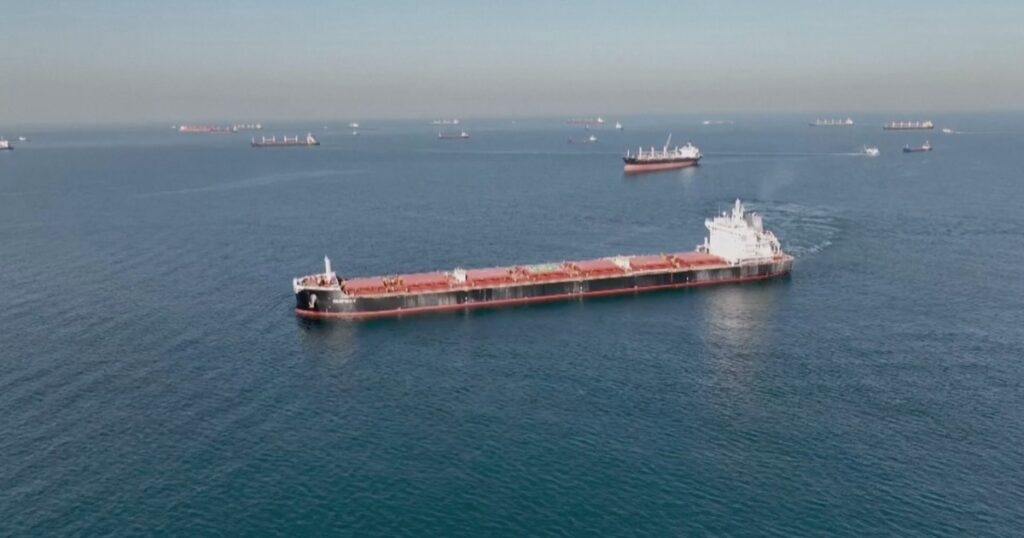Diplomatic efforts salvaged a wartime agreement that allowed Ukrainian grain and other commodities to reach world markets, with Russia saying on Wednesday (local time, overnight NZT) it would stick to the deal after Ukraine pledged not to use a designated Black Sea corridor to attack Russian forces.
Vladimir Putin, the president of Russia, issued a warning, noting that if Kiev breaks its word, Moscow maintains the right to withdraw from the accord once more.
“We demanded assurances and guarantees from the Ukrainian side that . . . humanitarian corridors will not be used for military purposes,” Putin told a Security Council meeting, according to Russian state news agencies.
I’ve instructed the Ministry of Defence to restore our full involvement in this project.
The Turkish president Recep Tayyip Erdogan’s “neutrality in the crisis as a whole” and his attempts to “ensure the interest of the poorest countries” were praised by the Russian leader, along with Turkey’s mediation efforts to put the accord back on track.
Over the weekend, Russia withdrew from the grain agreement, citing claims that a Ukrainian drone had attacked its Black Sea fleet in Crimea. Ukraine did not claim responsibility for the alleged attack.
Erdogan stated that the renegotiated agreement would once more go into effect, giving priority to exports to African countries including Somalia, Djibouti, and Sudan. That’s in line with Russia’s concerns that most of the exported grain had ended up in richer nations since Moscow and Kyiv made separate agreements with Turkey and the UN in July.
According to UN humanitarian director Martin Griffiths, 49% of all shipments of wheat and 23% of the total cargo shipped from Ukraine under the grain agreement went to nations with lower or lower-middle incomes.
Antonio Guterres, the secretary-general of the UN, praised Russia for its announcement that put the accord back on track. Guterres “remains committed to remove the remaining barriers to the exports of Russian food and fertiliser,” according to UN spokesman Stephane Dujarric.
Russia and Ukraine are important international exporters of food to emerging nations, where many people are already suffering from hunger, including wheat, barley, sunflower oil, and other products. Prior to the grain deal, the loss of those supplies contributed to rising food prices, tens of millions of people falling into poverty, and rising energy prices.
According to the UN, the grain pact in July reduced global food prices by 15% from their March peak.
A “substantial number” of artillery shells were allegedly secretly shipped by North Korea to Russia in support of that country’s invasion of Ukraine, according to the White House.
The US believes North Korea is “trying to make it appear as though they’re being shipped to countries in the Middle East or North Africa,” according to National Security Council spokesperson John Kirby. He declined to provide a specific estimate on the quantity of ammunition being sent to bolster the Russian effort.
The ammo is being “covertly supplied” from North Korea to Russia, according to Kirby, but “we’re still monitoring this to see if the shipments are actually received.” He added that the US has “an idea” of which country or countries the North may funnel the weapons through but wouldn’t specify, because the administration continues to look at how it might respond to North Korea’s actions.
Citing Western attempts to resupply the Ukrainian military, Kirby emphasised that the North Korean shipments “are not going to affect the course of the fight.”
In Ukraine, thousands of homes in the Kyiv region and elsewhere remained without power, officials said, as Russian drone and artillery strikes continued to target the country’s energy infrastructure.
Oleksiy Kukeba, the governor of the Kyiv area, reported that 16,000 houses were without electricity and that power disruptions were caused by drone attacks on energy infrastructure in the Cherkasy region, south of the capital.
Although Kyiv’s water and electricity had been restored, Kuleba didn’t rule out “weeks” of electricity shortages should Russian forces continue to target the city’s energy facilities. He said that Russian forces were attempting to provoke a serious humanitarian situation in a Telegram post.
According to Dnipropetrovsk Governor Valentyn Reznichenko, power outages were also recorded in the southern cities of Nikopol and Chervonohryhorivka as a result of “a large-scale drone attack.”
Russia rejoins crucial grain export agreement for Ukraine during the war

